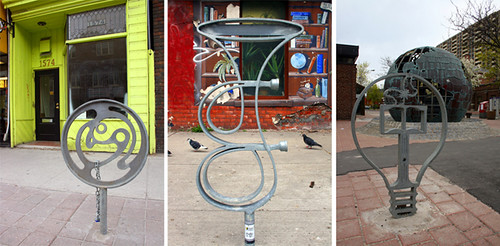Last week, Toronto curator
Kim Simon asked in a Facebook status update why none of the media covering the recent
Koffler Gallery scandal had bothered to question the ethical aspects of the
Koffler receiving public funding.
I responded that I had been thinking about the ethics of this situation, and wanted to do a blog post about it. What follows are the questions and uncertainties that came up for me in considering this situation.
To recap on details from
The Star,
NOW,
Xtra,
the artist’s website and other sources: Last year the Koffler—a Jewish cultural centre—contracted curator Kim Simon and artist Reena Katz to develop an art project that would open May 20, 2009. Katz, who is of Jewish descent and has worked on projects about Judaism in the past, developed a project called Each Hand as They Are Called, which was to involve a mah-jong tournament with Jewish elders, installing scaffolding in Kensington Market linked to the artist’s Jewish history and performances of songs by the Barry Sisters, a 50s duo that sang a hybrid of jazz and klezmer. On May 8, the Koffler Centre executive director Lori Starr informed Katz and Simon that the Koffler was disassociating itself from the project due to Katz’s participation in Israeli Apartheid Week and related events. The contracted funding would still go to Katz and Simon, but not the Koffler’s logo, name or endorsements. Later that week, the Jewish elders and a voice coach for the Barry Sisters project pulled out, putting the project in limbo. A number of artists have also dropped their contracts to do further work with the Koffler. The dispute is now being handled by lawyers for both parties.
My initial reaction,
posted on this blog May 11, was that the Koffler had been quite stupid and unprofessional in its decisions and actions around this whole affair. For over a year the Koffler has been trying to rebrand itself as being more “open” and “downtown” in its attitude, and the kind of toe-the-line rigidity this course of events reflects is well at odds with more flexible and liberal artworld attitudes.
So…. Dumb. But unethical? I wasn’t sure. And I’m still not, which is partly why I’m posting on this—feedback from others would be much appreciated.
Here’s why I still feel the ethical part of this situation is cloudy: Basically, when I think about how most galleries program artists and exhibitions—well, it may just be my cynicism talking, but I think most galleries do program artists who fit with their own political, aesthetic and cultural tastes.
In other words, I’d expect, say, the Japan Foundation to program artists who are of Japanese descent, or who make work about Japan. I wouldn’t expect them to program an artist who had extremely critical views of Japan or who isn’t connected to Japan in any way—and I wouldn’t expect that because artists of this type would be weeded out in the very very early stages of the curatorial process.
Similarly, and perhaps a bit closer to home, I wouldn’t expect La Centrale, a woman-focused gallery in Montreal, to program a male artist. Heck, I would also be very surprised if they curated in a woman artist who happened to be strongly pro-life or homophobic. That kind of value disparity is again the kind of thing that gets weeded out way ahead of time at the very early stages of the curatorial process—those matters of poor fit or alignment.
Even in the contemporary art world in general, I’d posit that views in general on politics are quite liberal, ambivalent and flexible. So it would be quite surprising if any contemporary museum curated an artist who did have a black and white, hardline or conservative view of politics. Again, it’s as if those types of personalities get self-selected (or perhaps just selected) out of the contemporary art world; their values just doesn’t fit with those types of institutions.
At the Koffler, now, we see basically the opposite values dynamic. It’s clear from this episode that the Koffler wants artists who reject political ambivalence and flexibility, who are willing to be hardline when it comes to Israel—or at least artists who do not express any potential difficulties with Israel, period, in their work or public life.
That’s why I labeled the Koffler’s actions dumb rather than unethical. If your programming has to be in line with certain politics and values, you flag any major conflicts (whether consciously or subconsciously) at the very beginning of the process rather than at the end. Since the public funds the Koffler was to disburse were still disbursed to the artists, there is less of a case that can be made there about ethics as well.
Does this mean in future that public funding will be withheld from the Koffler? Well, it’s hard to tell, because as a friend pointed out to me there aren’t many mechanisms for listing “all the wrong stuff we did with the grant monies you gave us” on a funding application. And further, as noted above, culturally-focused galleries do often have an inherently exclusive programming slant in the first case.
Of course, I’m puzzled by my own inability in this case to make a clear ethical judgment. If anyone else would like to express their views on the case, pose their own questions, or clarify my fuzzy thinking, I’d much appreciate it.


















.jpg)














